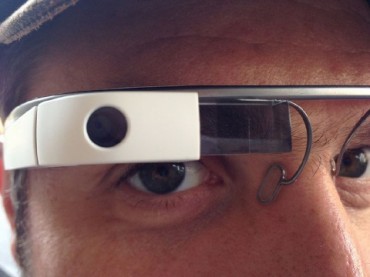
Can Google Glass change the face of journalism? One professor thinks so.
University of Southern California professor Robert Hernandez will launch the nation’s first-ever Google Glass journalism course this fall that asks students to develop apps for the device that can harness news stories.
“In this course you will research, design and develop new journalism-focused experiences for wearables, concentrating on Google Glass,” the syllabus states. “You will explore and help define the creation and consumption of journalistic content optimized for this emerging platform.”
Google Glass, one of the most controversial tech gadgets to hit the market in recent years, is a computer worn like a pair of glasses that includes a camera, which can take pictures and video, as well as identify images users see before them. The device has prompted massive privacy concerns across the nation.
But Hernandez, a USC assistant professor of professional practice for the Annenburg School of Communication and Journalism, said he sees it as something that will advance reporting techniques, and is eager to pave the way.
“Our failures need to be as public as our success,” Hernandez said in an interview with The College Fix. “I want the journalism field to develop as a result of this class.”
While many have expressed everything from extreme caution to overt outrage over the devices (an emerging nickname for people who wear them is “Glassholes”), Hernandez doesn’t see mixing Google Glass and journalism as a problem.
“I’m looking at how it will affect journalism from the creation side,” he said last fall at a Google Glass seminar at USC. “Quite honestly, when has journalism ever benefited from ignoring or dismissing technology? Someone’s got to play with it and figure it out.”
Clearly, students agree. Hundreds attempted to sign up for Glass Journalism, and Hernandez hand-selected the class’s 12 students using an interview process.
“This is an amazing, amazing group of people, who happen to be students,” Hernandez told The College Fix. “They know our goal, and that’s to develop something into Glass.”
The course will not follow a traditional lecture-style format; students are graded based on their hands-on projects for the class.
“This class is not about grades,” Hernandez said. “It offers more than just an A or B on your GPA. It’s about everyone rolling up their sleeves and learning by working. They’re getting real world experience.”
USC engineering junior David Carr was one of the first students to encourage Hernandez to develop the class, and he told The College Fix he looks forward to creating usable apps for Google Glass as a result.
“We hope to have one or more apps released to Glass store,” Carr said. “We want some thing real, finalized, quality, and not just an experiment that never sees the light of day.”
Hernandez echoed this note of seriousness and excitement for the class’s outcome.
“This class isn’t about Glass,” Hernandez said. “The class is using a shiny object on a platform to develop something real.”
Carr said students hope to explore primarily two areas: first, content creation, and second, a tool for content consumption.
“As a tool to experience and read on the go, Glass has huge potential not tapped by any existing apps,” Carr said.
Glass class’s 12 students have already met two times to get to know each other and start the process, “meetups” that were open to the public. Their online announcement read: “There will be food. There will be Glass. There will be a lot of nerding out.”
The process is open to the public, who can keep up with Glass class students on their website glassjournalism.io or on Twitter using the hashtag #glassjournalism.
“Glass Journalism” is not the first time Google Glass has been used at the university level, reports Mashable: “A Syracuse University professor tasked his social-media class with creating Glass apps last fall, and Northeastern University in Boston did something similar with Glass and healthcare around the same time.”
In March, The College Fix also reported on how “Google evangelists” work to bring the devices to campuses for development.
College Fix contributor Macaela Bennett is a student at Hillsdale College.
Like The College Fix on Facebook / Follow us on Twitter
IMAGE: Michael Praetorius/Flickr






Please join the conversation about our stories on Facebook, Twitter, Instagram, Reddit, MeWe, Rumble, Gab, Minds and Gettr.